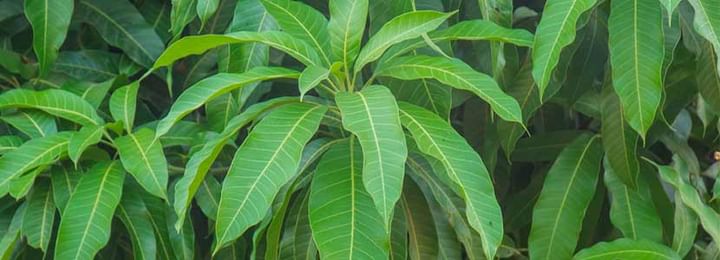Benefits of Mango Leaves And Its Side Effects
Last Updated: Aug 21, 2020
The benefits of mango leaves are unknown to many but it has a myriad of health benefits that we are absolutely foolish to ignore. It treats or regulates many of the contemporary health problems and lifestyle diseases.
It is known to regulate diabetes and lower blood pressure. It treats dysentery and is good for the gut overall. Respiratory problems can be cured by mango leaves. Restlessness is a condition that is irritating and creates a lot of problems. Mango leaves can effectively fight restlessness. It can also heal burns and is a good remedy of ear aches.
Mango Leaves
Whenever it comes to mangoes, we never consider beyond the fruit. We are so obsessed with the fruit that we miss out on the health benefits provided by mango leaves. Mango leaves are fleshy and shiny with a sharp tip.
The leaves can be consumed in two ways, either in powdered form or as a concoction made by boiling the leaves in water. The leaves are rich in anti-oxidant properties. Apart from being useful in medicine, it can also be utilised in the culinary field as can been seen by the fact that mango leaves are cooked and eaten in South East Asia.
Nutritional Value of Mango Leaves
Mango leaves are rich in vitamins C,B and A. They are also rich in flavonoids and phenol which impart anti-oxidant properties to the leaves.
Health Benefits of Mango Leaves
Regulates diabetes
The tender leaves of mango may contain tannins and anthocyanins that is effective in treating diabetes in its early stages. Not only that, it also helps to treat diabetic angiopathy and diabetic retinopathy.
The leaves contain a compound called taraxerol 3-beta and ethyl acetate extract that stimulates the synthesis of glycogen. The leaves can be consumed in powdered form or in an infusion.
To alleviate the symptoms of diabetes, soak the leaves in water overnight then strain the leaves and drink the water. The leaves can also be used to treat hyperglycemia.
Lowers blood pressure and risk of hypertension
Mango leaves have hypotensive properties which means they can help lower blood pressure They help in strengthening the blood vessels and treating the problems of the varicose veins. Mango leaves tea can help treat hypertension. It strengthens the fragile blood vessels that can cause hypertension.
Dissolve gall and kidney stones
Mango leaves help dissolve gall and kidney stones. Dry the mango leaves in the shade and grind it into fine powder. Mix the powder with water and rest it overnight. Drink this mixture daily to dissolve kidney stones.
Treats restlessness
Anxiety has unfortunately become one of the most common ailments that affect the youth. Anxiety brings about restlessness which is annoying both to people who are suffering from it and people who surround them. Mango leaves provide a good home remedy for restlessness. Adding 2-3 cups of mango leaves tea to bath water relieves restlessness.
Cures respiratory problems
Mango leaves are good for all kinds of respiratory problems. It is especially useful for people suffering from cold, bronchitis and asthma. Respiratory problems cause a huge to everyday life and so steps must be taken to eradicate it. Boil mango leaves and add honey to it to make a concoction. Drinking this concoction cures cough.
Cures dysentery
Mango leaves are very helpful in treating bleeding dysentery. The leaves should be powdered after drying them in the shade. Mix that with water and consume the concoction 2-3 times a day to stop dysentery.
Provides relief from ear aches
Ear aches are very painful and irritating. It is mainly caused by impacted ear wax, water in the ear canals or infection. A teaspoon of juice extracted from the leaves can be used as ear drops to provide relief from the pain. Heat the juice slightly before using. This is a completely natural remedy to ear aches and so it has no side effects. Also it is simple enough to be able to do it by yourself at home.
Heal burns
Cures hiccups
Prevents various stomach ailments
Stomach ailments are common in our daily lives. It can be both trivial or serious. Nonetheless, it is important that we keep our intestines healthy since a healthy stomach is quintessential in a healthy lifestyle. Soak mango leaves in warm water overnight. Strain the water and consume it every day on an empty stomach. This infusion acts as a stomach tonic and prevents many stomach illnesses.
Uses of Mango Leaves
Apart from the myriad of health benefis that mango leaves have, it can also be dried and brewed to make tea.
Side Effects and Allergies of Mango Leaves
There is no such noted adverse effects of using Mango Leaves
Cultivation of Mango Leaves
Historians have suggested that mango originated from a large area including North-western Myanmar, Bnagladesh and North-eastern India. Accounts of earlier historians and travellers might suggest that mango originated in India and then spread to south East Asia and rest of the world but taxonomic and recent molecular evidence has negated that premise. Mango trees grow best in tropical nd sub-tropical climates.
References
- Nikhal S, Mahajan SD. Evaluation of antibacterial and antioxidant activity of Mangifera indica (leaves). Journal of Pharmaceutical Sciences and Research. 2010;2(1):45. [Cited 27 June 2019]. Available from:
- Stohs SJ, Swaroop A, Moriyama H, Bagchi M, Ahmad T. A Review on Antioxidant, Anti-Inflammatory and Gastroprotective Abilities of Mango (Magnifera indica) Leaf Extract and Mangiferin. J Nutr Health Sci. 2018;5(3):303. [Cited 27 June 2019]. Available from:
- Mustapha AA, Enemali MO, Olose M, Owuna G, Ogaji JO, Idris MM, Aboh VO. Phytoconstituents and Antibacterial efficacy of Mango (Mangiferaindica) leave extracts. Journal of Medicinal Plants Studies. 2014 Sep 11;2(5):19-23. [Cited 27 June 2019]. Available from:
Table of content
Ask a free question
Get FREE multiple opinions from Doctors



